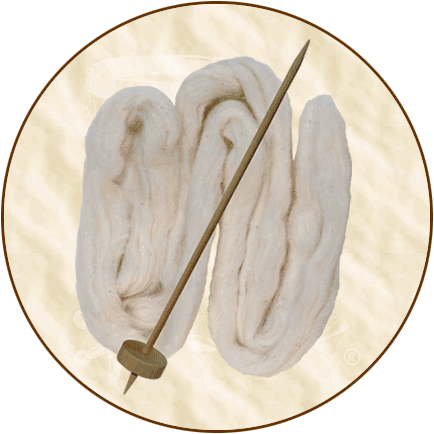.
Continued from product description
on Home Crafts' Page Seven...
Historical
Background: Cotton is a plant, which produces a short,
fine fiber between 1/2 inch and 1-1/2 inches in length. "Cotton"
is an English word that comes from the Sanskrit word "karpasa."
Cotton grows in warm regions and has been cultivated for millennia.
Shreds of cotton cloth and cotton bolls have been discovered
in a Mexican cave that are at least 7,000 years old. Other discoveries
have been made in Pakistan dating back to 3000 B.C. India is
thought to have been the first country to actually cultivate
cotton, but people in Egypt's Nile River Valley and others in
Peru were also familiar with cotton farming. India manufactured
and exported a cotton cloth called "muslin" to the
Roman Empire as well as Medieval Europe. India continued to export
fine muslin cloth until about 200 years ago.
By the early 1500s, Native Americans were growing cotton in
America, as documented by the Coronado expedition of 1540-1542.
Spaniards who settled in the Florida region began to grow cotton
in 1556. When Navajo tribes migrated south from northwestern
Canada in the 1300s or 1400s, they learned to grown, spin, and
weave cotton.
England, on the other hand, had such a profitable wool market
that they enacted laws against the import and export of cotton
cloth. However, these laws didn't stop many American colonists
from building a cotton-based industry.
In 1607, cotton planting began in Virginia along the James
River and soon spread throughout the southern colonies. Since
then, cotton plantations have flourished in the "cotton
belt" of the United States (Virginia, North Carolina, South
Carolina, Georgia, Florida, Alabama, Mississippi, Tennessee,
Arkansas, Missouri, Louisiana, Kansas, Oklahoma, Texas, New Mexico,
Arizona, and California). Today, there are five prominent types
of commercial cotton: Egyptian, Sea Island, American Pima, Asiatic,
and Upland.
The cotton industry involves many procedures, most of which
were done by hand for centuries. In 1790, Samuel Slater, an English
mill worker, migrated to America and is credited with building
the first North American cotton mill -- from memory! In 1793,
Eli Whitney invented the cotton gin, which separated the lint
(cotton fibers) from their seed husks. Other improvements were
made during the second half of the 17th century.
In the early 1930s, a cotton picker was designed that would
pick approximately 8,000 pounds of seed cotton in one day. Today,
cotton harvesters can harvest 190,000 pounds of seed cotton in
one day!
The world's cotton industry presently provides millions of
jobs. Cotton is used for making clothing, household goods, medical
supplies, industrial thread, and paper money. Even the cotton
seeds' oil is used to process foods such as mayonnaise, margarine,
and baking and frying oils. Cotton oil is also used in making
rubber, explosives, insecticides, cosmetics, and soaps.
Please see our Cotton Hand Spindle
Only (4605) for the historical background of hand spindles
for cotton. Likewise, see our Cotton
Sliver (4606) for the historical background of cotton.













